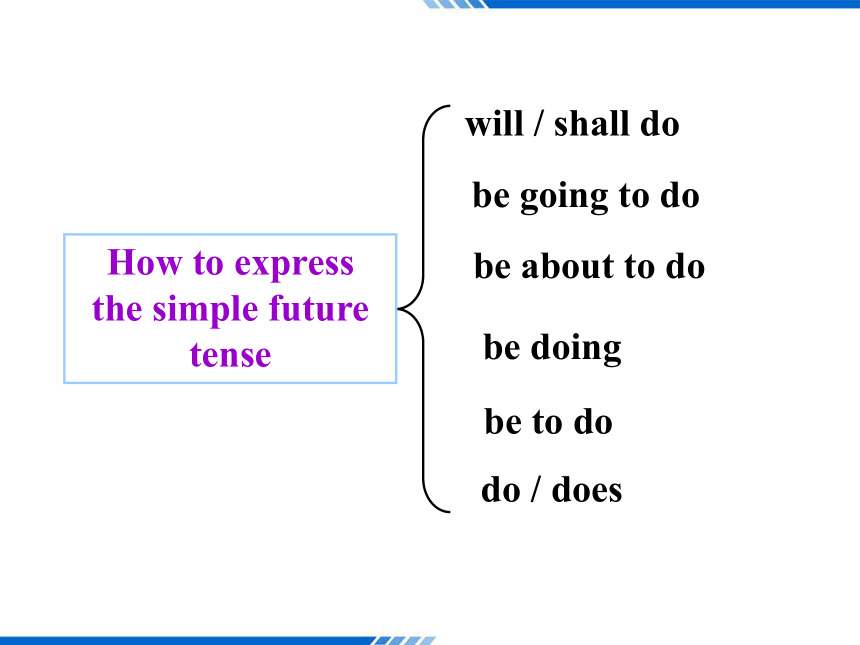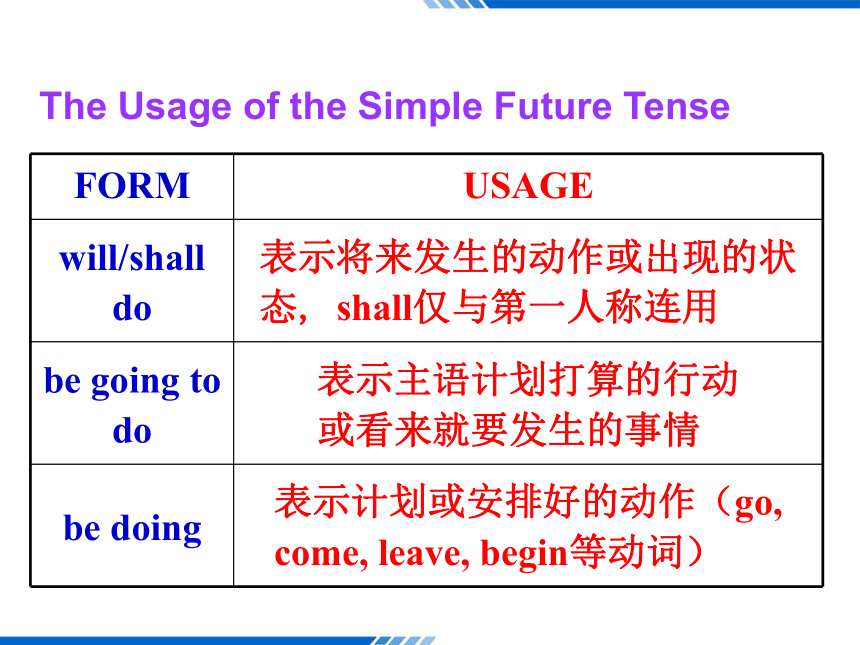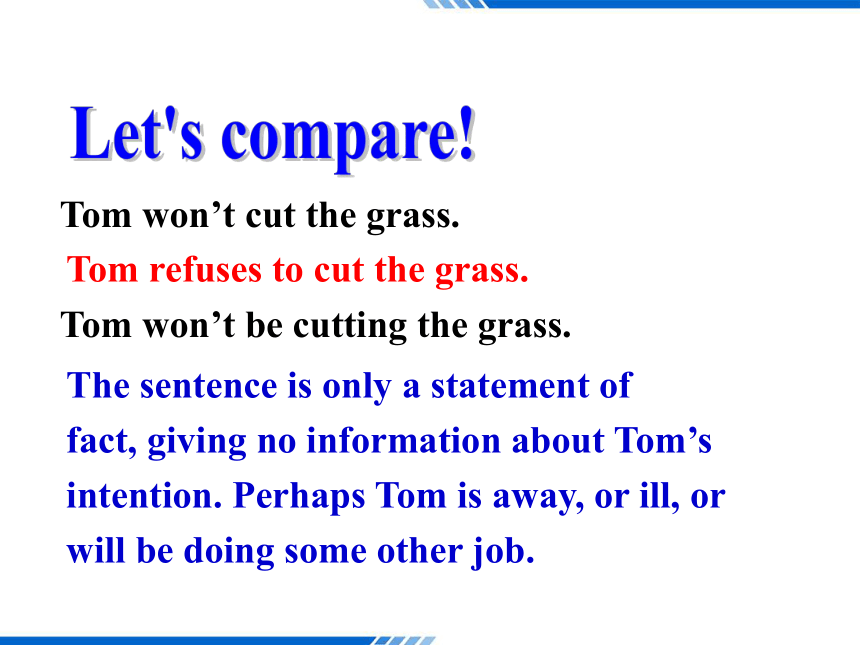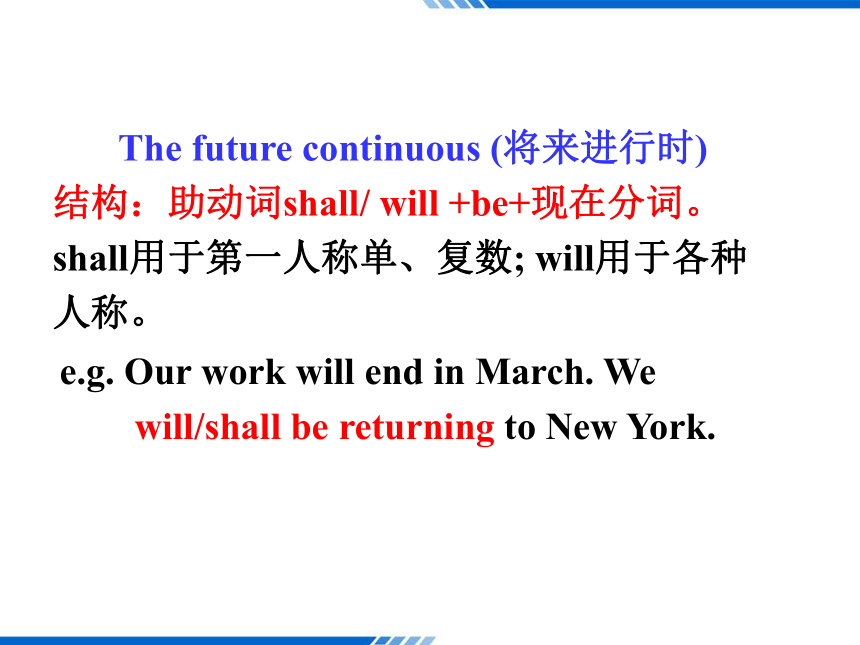Module 1 Life in the Future Grammar PPT (40张ppt)
文档属性
| 名称 | Module 1 Life in the Future Grammar PPT (40张ppt) |

|
|
| 格式 | zip | ||
| 文件大小 | 1.5MB | ||
| 资源类型 | 教案 | ||
| 版本资源 | 外研版 | ||
| 科目 | 英语 | ||
| 更新时间 | 2022-01-30 00:00:00 | ||
图片预览












文档简介
(共40张PPT)
Module 1
Module 1
Life in the Future
The future continuous
To learn about the future continuous.
1. Where will we be living in 20 years’ time
2. We won’t be living underground or in space.
3. We will be living in houses and flats just as we do today.
Are you familiar with these sentences
4. At nine o’clock tonight I will be doing
my homework.
5. In the year 3000 a lot of people will be
living on space stations.
6. You needn’t cook supper, Mum. I shall
be cooking dinner tonight.
7. Tom will be telling you about it this
afternoon.
will / shall do
be going to do
be about to do
do / does
be doing
be to do
How to express
the simple future tense
FORM USAGE
will/shall do 表示将来发生的动作或出现的状态, shall仅与第一人称连用
be going to do 表示主语计划打算的行动
或看来就要发生的事情
be doing 表示计划或安排好的动作(go, come, leave, begin等动词)
The Usage of the Simple Future Tense
FORM USAGE
be to do 表示客观上计划或安排好
的动作
be about to do 表示即将发生的动作,
一般不带时间副词或短语
do 表示与安排,计划或时刻表有关的动作;或用于if, when等状语从句中代替will do.
Tom won’t cut the grass.
Tom won’t be cutting the grass.
Let's compare!
Tom refuses to cut the grass.
The sentence is only a statement of
fact, giving no information about Tom’s
intention. Perhaps Tom is away, or ill, or will be doing some other job.
The simple future tense expresses a future action with intention.
The future continuous tense expresses a future action as a statement of fact.
The future continuous (将来进行时)
结构:助动词shall/ will +be+现在分词。
shall用于第一人称单、复数; will用于各种人称。
e.g. Our work will end in March. We will/shall be returning to New York.
用法
1. 表示将来某一时刻或某一段时间里正在进行的动作。
e.g. We will be seeing a fashion show
this time tomorrow afternoon.
2. 代替一般将来时(口语中),使语言生动形象。用法如下:
1) 预料将要发生的动作或情况。
e.g. The train will be arriving soon.
2) 表示现已决定或安排将要做的事。
e.g. Doctor Smith will be giving
another talk on family health
at the same time next week.
3. 表示预料不久要发生或势必要发生的
事情或将来的某种可能性,料想、估计的含义。如:
We believe that peasants’ life will be
getting better and better.
我们相信农民的生活会越来越好。
If we don’t do so, we shall be making a
serious mistake.
如果我们不那样做,我们就会犯严重的
错误。
4. 表示亲切或委婉的语气。
e.g. When shall we be meeting again
我们什么时候再见面?
5. 表示现在或未来一个动作之后接着的
另一个动作,前后两个动作是根据安
排紧接着进行的。
e.g. Bob is leaving school in July, and
then he’ll be going to university.
6. 表示婉转口气,表达有礼貌的询问或请求。
e.g. Will you be having some tea
Will you be lending me your
dictionary
注意: 将来进行时可以与be going to连用。
e.g. I’m going to be working all day
tomorrow, so I won’t have time to
buy Mother’s present.
将来进行时常用的时间状语有soon, tomorrow, this evening, on Sunday, by this time tomorrow, in two days, tomorrow evening等。
e.g. By this time tomorrow, I’ll be lying
on the beach.
将来进行时与现在进行时
1. 现在进行时表示一种经过考虑的、将来要进行的动作, 而将来进行时通常表示正常过程中会发生的动作,因此将来进行时不如现在进行时那样肯定,比后者偶然性要大一些:
e.g. I am seeing Tom tomorrow.
I’ll be seeing Tom tomorrow.
第一句意指汤姆或说话人已经特意安排了这次会面;
第二句意指汤姆和说话人将在日常进程中见面。
这种差别并不是在任何情况下都很重要,常常两者都可以使用。
He’ll be taking his exam next week.
也可以说:
He is taking his exam next week.
He won’t be coming to the party.
也可以说:
He isn’t coming to the party.
2. 现在进行时常用于表示不远的将来动作,必须有确定的时间;
将来进行时可以和确定时间状语连用,也可以不连用;既可以表示不远的将来的动作,也可表示较远的将来。
e.g. We are meeting him tomorrow.
We will be meeting him tomorrow/ next year. (将来进行时)
【语境应用】用动词的正确形式填空。
1. A: I ______________ (arrive) at the station tomorrow morning.
B: OK. I __________________ (wait) for you when your train arrives.
will/shall be waiting
will/shall arrive
2. A: The holiday ________ (come). What are you planning to do
B: I’m going to travel to Hong Kong. Actually, I will be on the plane tonight, and this time tomorrow I ____________________ (shop) in the mall. What about you
A: You know I have always wanted to go to Sanya, so probably I ________________ (lie) on a beach when you are shopping.
will/shall be lying
will/shall be shopping
is coming
3. A: We are having a party tonight. Would you like to join us
B: I’d like to, but I’m afraid I ______________________ (babysit) my little brother this evening.
will/shall be babysitting
At nine o’clock tonight I ____________ (do) my homework.
Don’t call me before seven. I ___________________ (get dressed).
They ________________ (not work) next Thursday. It’s a public holiday.
will be doing
will be getting dressed
won’t be working
Complete the sentences with the verbs in brackets using the future continuous.
4. In the year 3000 a lot of people ___________ (live) on space stations.
5. _____ you __________ (stay) here next summer
6. This time next year I ___________ (lie) on a beach.
will be living
Will be staying
will be lying
用括号内所给动词的适当时态填空。
1. If Tom __________ (sleep) when you come back, don’t bother him, please.
2. —May I meet you at 9 o’clock tomorrow
morning
—I’m afraid not. I _______________ (attend)
a meeting then.
3. The train _____________ (go) at its present speed until it reaches the foot of the mountain at about nine o’clock tonight.
is sleeping
will be attending
will be going
4. —I ________ (be) 21 tomorrow.
—Happy birthday to you!
5. At this time tomorrow I ___________ (fly) over the Pacific, heading home to visit my parents.
6. By the time you arrive home, Tom ____________ (do) his homework, so please don’t make any noise.
7. Tomorrow I am going to leave for home. When I _______ (arrive) at the airport, my whole family _______________ (wait) for me.
will be
will be flying
will be doing
arrive
will be waiting
8. A: When do you leave for Florida
B: Tomorrow. Just think! In two days from
now I _____________ (lie) on the
beach in the sun.
9. A: How can I get in touch with you while
you’re out of town
B: I ________________ (stay) at the Pilgrim
Hotel. You can reach me there.
will be lying
will be staying
10. A: Do you think life will be very different in
100 years from now
B: Of course. I can picture it in my mind.
People _____________ (live) in
houses that
they can take with them if they have to
move, and they _____________ (drive)
air cars that can go at high speeds.
A: That sounds fascinating
will be living
will be driving
完成下面短文。
In the future, robots 1. ________ (will be performing / are performing) more and more tasks for humans. This 2. ________ (will be having / will have) both positive and negative effects. On the other hand, humans 3. ______________ (will be spending / is spending) more time on interesting pursuits with robots doing the boring and dangerous
jobs.
will be
will have
will be spending
In this way robots are going to be making life a lot easier for humans. However, the widespread use of robots is going to create a lot of future unemployment. People 4. _____________ (will be losing / have lost) their jobs as robots fill their positions. And some people predict that, before too long, robots 5. ______________ (will be fighting / are fighting) in wars instead of people.
will be losing
will be fighting
将来进行时
【归纳】
将来进行时表示将来某一时间正在进行 的动作、预料要发生的或即将发生的动作。
一、构成
肯定形式 shall / will + be +V-ing形式
否定形式 shall / will not + be +V-ing形式
二、用法
1. 表示将来某一时刻或某段时间内发生的动作, 常与表将来的时间状语连用。
5. 表示未来的结果。
6. 表示委婉的语气。
2. 表示已经决定/安排好的要发生的动作。
3. 表示预料中要发生的动作。
4. 解释将来动作发生的原因。
选用括号内合适的内容补全下面句子。
1. Perhaps John ______________ (will organize /has organized) the games at the party. I’ll ask him. He’s good at that sort of thing.
2. It is no use trying to see him at six this evening, because he ______________ (will be giving/gives) a lesson then.
will organize
will be giving
3. This time next week, Philip ______________ (is working/will be working) in that company.
4. Here, give me the bottle. I ______________ (will open/will be opening) it for you.
5. Please don’t call me at this time tomorrow afternoon. I ______________ (am seeing/will be seeing) a fashion show then.
will be working
will open
will be seeing
Finish the exercises about Grammar on Page 67 in the Workbook.
Write down what you will be doing…
at 6 o’clock this evening
at half past eleven this evening
this time tomorrow
this time next year
Module 1
Module 1
Life in the Future
The future continuous
To learn about the future continuous.
1. Where will we be living in 20 years’ time
2. We won’t be living underground or in space.
3. We will be living in houses and flats just as we do today.
Are you familiar with these sentences
4. At nine o’clock tonight I will be doing
my homework.
5. In the year 3000 a lot of people will be
living on space stations.
6. You needn’t cook supper, Mum. I shall
be cooking dinner tonight.
7. Tom will be telling you about it this
afternoon.
will / shall do
be going to do
be about to do
do / does
be doing
be to do
How to express
the simple future tense
FORM USAGE
will/shall do 表示将来发生的动作或出现的状态, shall仅与第一人称连用
be going to do 表示主语计划打算的行动
或看来就要发生的事情
be doing 表示计划或安排好的动作(go, come, leave, begin等动词)
The Usage of the Simple Future Tense
FORM USAGE
be to do 表示客观上计划或安排好
的动作
be about to do 表示即将发生的动作,
一般不带时间副词或短语
do 表示与安排,计划或时刻表有关的动作;或用于if, when等状语从句中代替will do.
Tom won’t cut the grass.
Tom won’t be cutting the grass.
Let's compare!
Tom refuses to cut the grass.
The sentence is only a statement of
fact, giving no information about Tom’s
intention. Perhaps Tom is away, or ill, or will be doing some other job.
The simple future tense expresses a future action with intention.
The future continuous tense expresses a future action as a statement of fact.
The future continuous (将来进行时)
结构:助动词shall/ will +be+现在分词。
shall用于第一人称单、复数; will用于各种人称。
e.g. Our work will end in March. We will/shall be returning to New York.
用法
1. 表示将来某一时刻或某一段时间里正在进行的动作。
e.g. We will be seeing a fashion show
this time tomorrow afternoon.
2. 代替一般将来时(口语中),使语言生动形象。用法如下:
1) 预料将要发生的动作或情况。
e.g. The train will be arriving soon.
2) 表示现已决定或安排将要做的事。
e.g. Doctor Smith will be giving
another talk on family health
at the same time next week.
3. 表示预料不久要发生或势必要发生的
事情或将来的某种可能性,料想、估计的含义。如:
We believe that peasants’ life will be
getting better and better.
我们相信农民的生活会越来越好。
If we don’t do so, we shall be making a
serious mistake.
如果我们不那样做,我们就会犯严重的
错误。
4. 表示亲切或委婉的语气。
e.g. When shall we be meeting again
我们什么时候再见面?
5. 表示现在或未来一个动作之后接着的
另一个动作,前后两个动作是根据安
排紧接着进行的。
e.g. Bob is leaving school in July, and
then he’ll be going to university.
6. 表示婉转口气,表达有礼貌的询问或请求。
e.g. Will you be having some tea
Will you be lending me your
dictionary
注意: 将来进行时可以与be going to连用。
e.g. I’m going to be working all day
tomorrow, so I won’t have time to
buy Mother’s present.
将来进行时常用的时间状语有soon, tomorrow, this evening, on Sunday, by this time tomorrow, in two days, tomorrow evening等。
e.g. By this time tomorrow, I’ll be lying
on the beach.
将来进行时与现在进行时
1. 现在进行时表示一种经过考虑的、将来要进行的动作, 而将来进行时通常表示正常过程中会发生的动作,因此将来进行时不如现在进行时那样肯定,比后者偶然性要大一些:
e.g. I am seeing Tom tomorrow.
I’ll be seeing Tom tomorrow.
第一句意指汤姆或说话人已经特意安排了这次会面;
第二句意指汤姆和说话人将在日常进程中见面。
这种差别并不是在任何情况下都很重要,常常两者都可以使用。
He’ll be taking his exam next week.
也可以说:
He is taking his exam next week.
He won’t be coming to the party.
也可以说:
He isn’t coming to the party.
2. 现在进行时常用于表示不远的将来动作,必须有确定的时间;
将来进行时可以和确定时间状语连用,也可以不连用;既可以表示不远的将来的动作,也可表示较远的将来。
e.g. We are meeting him tomorrow.
We will be meeting him tomorrow/ next year. (将来进行时)
【语境应用】用动词的正确形式填空。
1. A: I ______________ (arrive) at the station tomorrow morning.
B: OK. I __________________ (wait) for you when your train arrives.
will/shall be waiting
will/shall arrive
2. A: The holiday ________ (come). What are you planning to do
B: I’m going to travel to Hong Kong. Actually, I will be on the plane tonight, and this time tomorrow I ____________________ (shop) in the mall. What about you
A: You know I have always wanted to go to Sanya, so probably I ________________ (lie) on a beach when you are shopping.
will/shall be lying
will/shall be shopping
is coming
3. A: We are having a party tonight. Would you like to join us
B: I’d like to, but I’m afraid I ______________________ (babysit) my little brother this evening.
will/shall be babysitting
At nine o’clock tonight I ____________ (do) my homework.
Don’t call me before seven. I ___________________ (get dressed).
They ________________ (not work) next Thursday. It’s a public holiday.
will be doing
will be getting dressed
won’t be working
Complete the sentences with the verbs in brackets using the future continuous.
4. In the year 3000 a lot of people ___________ (live) on space stations.
5. _____ you __________ (stay) here next summer
6. This time next year I ___________ (lie) on a beach.
will be living
Will be staying
will be lying
用括号内所给动词的适当时态填空。
1. If Tom __________ (sleep) when you come back, don’t bother him, please.
2. —May I meet you at 9 o’clock tomorrow
morning
—I’m afraid not. I _______________ (attend)
a meeting then.
3. The train _____________ (go) at its present speed until it reaches the foot of the mountain at about nine o’clock tonight.
is sleeping
will be attending
will be going
4. —I ________ (be) 21 tomorrow.
—Happy birthday to you!
5. At this time tomorrow I ___________ (fly) over the Pacific, heading home to visit my parents.
6. By the time you arrive home, Tom ____________ (do) his homework, so please don’t make any noise.
7. Tomorrow I am going to leave for home. When I _______ (arrive) at the airport, my whole family _______________ (wait) for me.
will be
will be flying
will be doing
arrive
will be waiting
8. A: When do you leave for Florida
B: Tomorrow. Just think! In two days from
now I _____________ (lie) on the
beach in the sun.
9. A: How can I get in touch with you while
you’re out of town
B: I ________________ (stay) at the Pilgrim
Hotel. You can reach me there.
will be lying
will be staying
10. A: Do you think life will be very different in
100 years from now
B: Of course. I can picture it in my mind.
People _____________ (live) in
houses that
they can take with them if they have to
move, and they _____________ (drive)
air cars that can go at high speeds.
A: That sounds fascinating
will be living
will be driving
完成下面短文。
In the future, robots 1. ________ (will be performing / are performing) more and more tasks for humans. This 2. ________ (will be having / will have) both positive and negative effects. On the other hand, humans 3. ______________ (will be spending / is spending) more time on interesting pursuits with robots doing the boring and dangerous
jobs.
will be
will have
will be spending
In this way robots are going to be making life a lot easier for humans. However, the widespread use of robots is going to create a lot of future unemployment. People 4. _____________ (will be losing / have lost) their jobs as robots fill their positions. And some people predict that, before too long, robots 5. ______________ (will be fighting / are fighting) in wars instead of people.
will be losing
will be fighting
将来进行时
【归纳】
将来进行时表示将来某一时间正在进行 的动作、预料要发生的或即将发生的动作。
一、构成
肯定形式 shall / will + be +V-ing形式
否定形式 shall / will not + be +V-ing形式
二、用法
1. 表示将来某一时刻或某段时间内发生的动作, 常与表将来的时间状语连用。
5. 表示未来的结果。
6. 表示委婉的语气。
2. 表示已经决定/安排好的要发生的动作。
3. 表示预料中要发生的动作。
4. 解释将来动作发生的原因。
选用括号内合适的内容补全下面句子。
1. Perhaps John ______________ (will organize /has organized) the games at the party. I’ll ask him. He’s good at that sort of thing.
2. It is no use trying to see him at six this evening, because he ______________ (will be giving/gives) a lesson then.
will organize
will be giving
3. This time next week, Philip ______________ (is working/will be working) in that company.
4. Here, give me the bottle. I ______________ (will open/will be opening) it for you.
5. Please don’t call me at this time tomorrow afternoon. I ______________ (am seeing/will be seeing) a fashion show then.
will be working
will open
will be seeing
Finish the exercises about Grammar on Page 67 in the Workbook.
Write down what you will be doing…
at 6 o’clock this evening
at half past eleven this evening
this time tomorrow
this time next year
